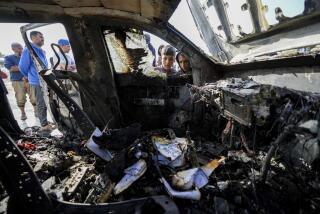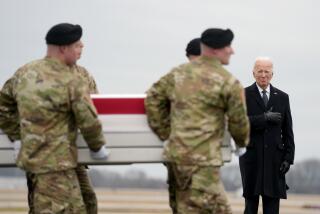7 Allied Officers Killed in Iraq
LATIFIYAH, Iraq — Fighters with automatic rifles and rocket-propelled grenades overwhelmed two cars of armed Spanish intelligence officers on a heavily traveled highway here Saturday, killing seven of the eight agents aboard in a brief but fierce battle.
Iraqi insurgents also killed two American soldiers and two Japanese diplomats in separate ambushes Saturday.
The attack raised to 111 the coalition’s combat death toll for November, the costliest month for the U.S. and its allies since the invasion of Iraq more than eight months ago. As the Spaniards’ bodies lay beside their burning cars, a few joyful Iraqis surged toward them, in some cases kicking or stepping on the corpses and chanting pro-Saddam Hussein slogans. One of the Spaniards was injured but survived the attack.
“These were holy warriors making jihad [holy war] against the invaders,” said Abdul Qader Faisal, a 26-year-old student among the Iraqis celebrating at the scene. “We don’t want the Americans here. We don’t want the Spanish here. The Americans have done nothing for us.”
Video footage from the scene, broadcast throughout the Arab world, showed rejoicing youths dancing alongside the burned remains of the four-wheel-drive vehicles. Many of the celebrants brandished parts of the vehicles.
Witnesses said the Spanish agents were ambushed by men armed with machine guns in two cars. The Spaniards’ vehicles veered off the road. Some agents may have returned fire, said residents of the rural area, about 20 miles south of Baghdad. Some witnesses said gunmen from nearby buildings also opened fire, suggesting that the assault was well coordinated.
An early U.S. ally in the war to remove Hussein, Spain has sent 1,300 troops to support the occupation, participating in an international division based in Hillah, south of Baghdad, and responsible for a sector of central Iraq. Ten Spaniards have been killed since the war began.
A statement issued by the coalition today said two U.S. soldiers were killed when a convoy of the 3rd Armored Cavalry Regiment was ambushed near Husaybah, a town near the Syrian border. A third soldier, who was wounded in the attack, was flown by helicopter to a nearby base hospital.
Separately, two Japanese diplomats were killed Saturday after their car was ambushed in northern Iraq, Japan’s Foreign Ministry said.
Details of the attack were still sketchy, but Foreign Minister Yoriko Kawaguchi said in Tokyo that the vehicle was ambushed near the city of Tikrit, where the envoys were to attend an aid conference.
Katsuhiko Oku, 45, headed the cultural affairs section of the Japanese Embassy in London and had been on assignment in Iraq. Masamori Inoue, 30, was a mid-level diplomat at the Baghdad mission.
Their driver, whose nationality was not immediately known, was seriously injured.
The killing of the two embassy officials is likely to disquiet Japan, which has been debating when to dispatch its troops to aid in Iraq’s reconstruction. The Japanese public remains wary of sending its troops to Iraq, and Prime Minister Junichiro Koizumi has declined to say exactly when the troops will be sent, saying only that he will send them after carefully studying the situation.
U.S. Secretary of State Colin L. Powell telephoned Kawaguchi to express his sympathy, the Foreign Ministry said. Kawaguchi told him that Japan would not waver in its commitment to the campaign against terrorism and the reconstruction of Iraq.
The Bush administration has been trying to expand its coalition to relieve the burden on U.S. forces. So far, it has not been able to enlist significant numbers of foreign troops. This month, 19 Italians, including two civilians, were killed in a bombing in the southern city of Nasiriyah, Italy’s highest military death toll since World War II.
Latifiyah, a Sunni Muslim stronghold on the edge of the so-called Sunni Triangle, has been the scene of several bloody incidents in recent weeks and witnessed the assassination of its pro-U.S. police chief a week ago.
A spokesman reached at the Spanish Defense Ministry in Madrid said those killed belonged to the National Intelligence Service and were traveling from Baghdad to the headquarters in Hillah. Four of the officers were scheduled to relieve the other four, and they were preparing to change posts. “They were attacked by RPG rockets and Kalashnikovs,” said the spokesman, who would not give his name.
U.S. officials had noted a sharp drop-off in attacks against coalition forces in recent days, saying it was the result of a more aggressive policy by the coalition military. But another possible explanation is that insurgents were following religious leaders’ exhortations to slow attacks during the Eid al-Fitr holiday at the end of the Muslim holy month of Ramadan. Eid al-Fitr ended Thursday.
Asked about the high level of casualties in November, a spokesman for the U.S. Central Command in Florida said that many of the losses came in a few unusually deadly attacks.
“There were a couple of incidents that involved a large number of soldiers, such as the helicopter crashes, that inflated the numbers,” said Cmdr. Dan Gage, a Central Command spokesman.
In recent weeks, hostile fire is believed to have been involved in the crashes of five U.S. military helicopters, killing 39 Americans.
A Pentagon spokeswoman said that as of 4 p.m. Friday, 298 U.S. soldiers had been killed in hostile fire in Iraq and 137 had died in nonhostile circumstances since the beginning of the war in March.
The top U.S. military commander in the country, Lt. Gen. Ricardo Sanchez, said at a news conference in Baghdad on Saturday that although officials believed that the Al Qaeda terrorist network was linked to the ongoing attacks in Iraq, they had yet to identify any Al Qaeda fighters in the country.
But Sanchez said there were continuing indications that foreign recruits might have played a part in the string of suicide bombings that have killed dozens in Iraq and terrorized a nation already traumatized by war. One assailant captured in a foiled attack on a Baghdad police station last month has been identified as a Yemeni.
“There could have been some operatives that blew themselves up,” said Sanchez, who noted similarities between the suicide attack on the Italian compound in southern Iraq and suicide car bombings in Saudi Arabia blamed on Al Qaeda. “When you look at the transfer of tactics and techniques, there’s some indicators that maybe they’re learning from each other.”
The role of foreign fighters in the turmoil has been a contentious question in Iraq for months.
Bush administration officials have tended to emphasize the involvement of foreign volunteers. But U.S. military commanders have generally downplayed the foreigners’ significance.
The Army says hard-line Iraqi loyalists of the former regime have financed and organized the attacks, although military officials acknowledge that the loyalists may have used the services of foreign-trained assailants in the suicide attacks.
On Friday, Italian and German police arrested three suspected members of a European-based network that had allegedly recruited Islamic extremists in Europe to fight in Iraq.
Italian officials said five such recruits had died in suicide attacks in Iraq in recent months, although the U.S. military in Iraq could not confirm the Italian account.
Even before the U.S. invasion, the Hussein government had paraded legions of foreign volunteers before the international media, identifying them as recruits willing to give their lives in the fight against the U.S. Some were killed in the fighting during the U.S. march to Baghdad, officials say. But some are believed to have escaped and may have linked up with former government elements, officials say.
Sanchez reiterated the military’s belief that Hussein loyalists represented the “key threat” facing the U.S.-led coalition now running Iraq.
Officials have raised the possibility that Hussein hard-liners might have formed an alliance with foreign suicide bombing recruits and might be using them to drive vehicles to targets selected and scouted by Iraqis.
As the military clashes continued, politicians on the Iraqi Governing Council working with the United States came closer to demanding that the Coalition Provisional Authority allow direct elections to choose the full transitional government that is scheduled to take over in June.
That would be a reversal of the policy agreed to less than two weeks ago by the coalition and the Governing Council in which regional caucuses would be held to select representatives to the new government.
Since then, Shiite Muslim leaders have become uneasy about the possibility that they might lose out unless there were direct elections. With the backing of the highly respected Grand Ayatollah Ali Sistani, they have begun to push hard to revisit the agreement.
After some lobbying, a majority of the Governing Council now supports direct elections, several members said.
U.S. officials have argued repeatedly that Iraq was not stable enough for such a popular vote.
*
Times staff writers Alissa J. Rubin in Baghdad and Edmund Sanders and Richard B. Schmitt in Washington and special correspondent Colin Joyce in Tokyo contributed to this report.
More to Read
Sign up for Essential California
The most important California stories and recommendations in your inbox every morning.
You may occasionally receive promotional content from the Los Angeles Times.









